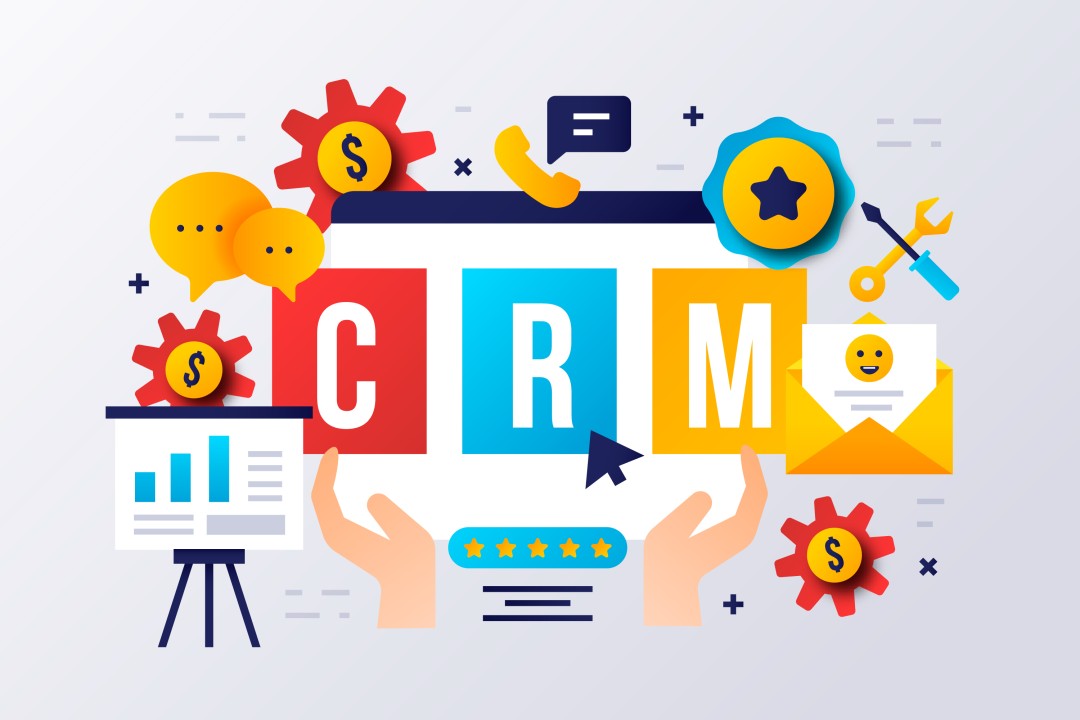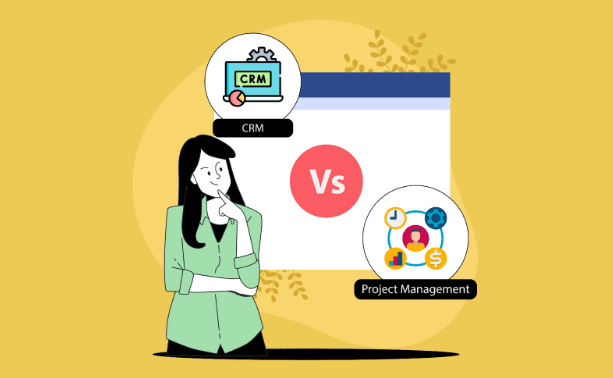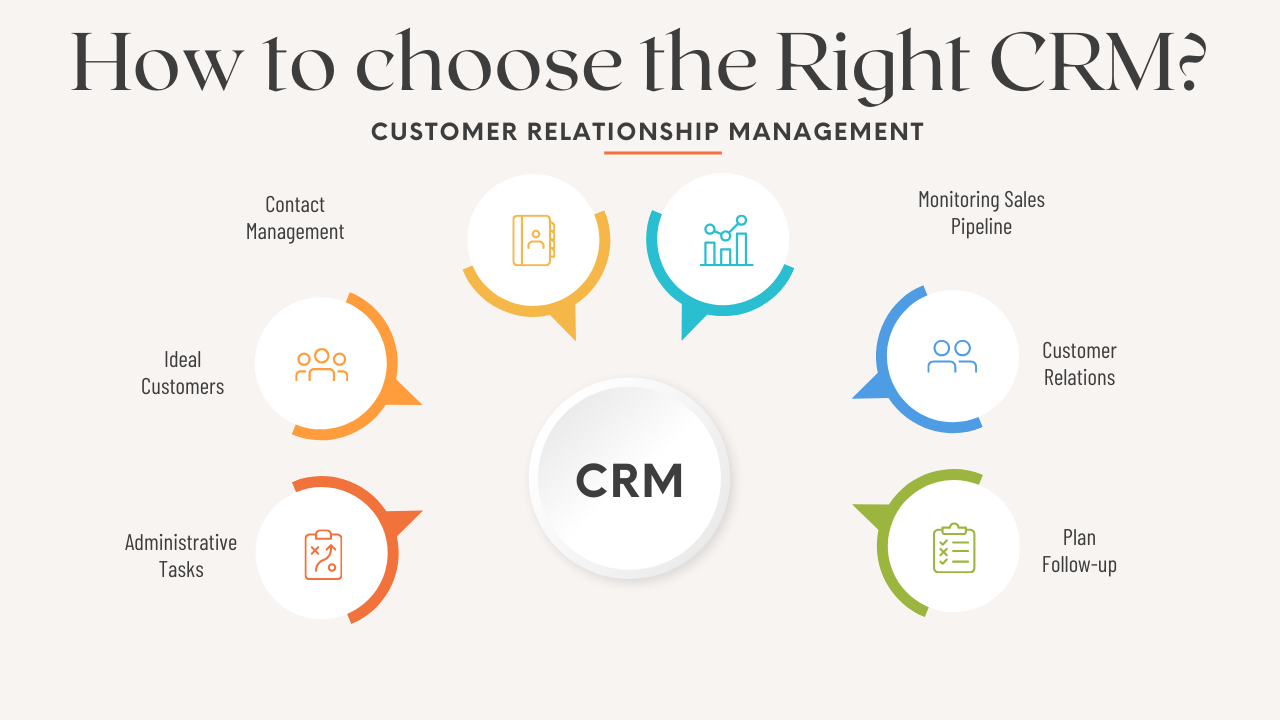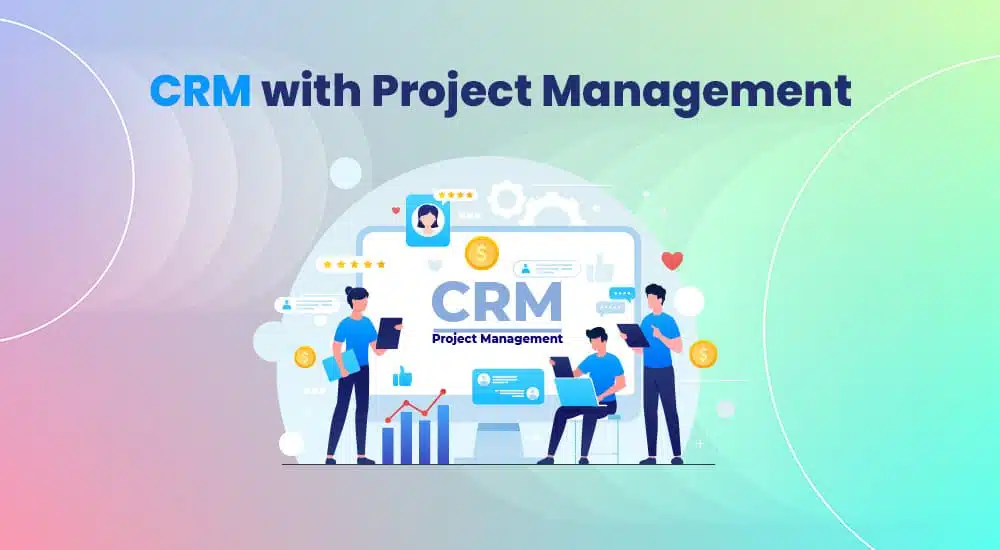A Guide to Choosing the Right CRM and Project Management Software
In the dynamic world of business, two software types stand tall in their respective fields: CRM (Customer Relationship Management) and Project Management. While CRM software is your go-to for managing interactions with potential and existing customers, project management software ensures your projects are delivered on schedule and within budget.
Yet, there’s a growing trend toward integrating these two powerhouses. Imagine a tool that gives you the best of both worlds – CRM project management. This solution simplifies your work and offers a more comprehensive view of your projects. Stick around, and let’s explore this exciting blend of client focus and project efficiency.
What Is CRM Software for Project Management?

Customer Relationship Management (CRM) software assists businesses in managing all their customer interactions. It’s geared toward keeping track of customers and improving their experiences. On the other hand, project management software ensures project delivery within definite deadlines and budgets. This integrated tool empowers small businesses with more effective control over customer interactions and project processes.
Most project management tools have features to assign and track tasks. They also aid in managing project timelines and automating workflows. They also closely monitor budgets, which is paramount for small businesses, which focus on efficient resource allocation.
Primary Applications
Project management software isn’t just about managing deadlines, stocks, or team members. It’s a tool that essentially aids in efficiently manifesting project plans and budgets. This enables businesses to optimize their processes, ensuring projects are continuously delivered on time and within set financial constraints.
What are the Main Objectives of Project Management Software?
The melding of CRM and project management software is shaping a new approach to managing businesses. These are some of its primarily focused on planning to achieve project goals.
- Helps complete projects in a timely manner and fosters clear team communication.
- Customer satisfaction always remains at the heart of this tool’s objectives.
- This integration aims to enhance customer relations and inject efficiency into project processes.
- Ensures tasks are kept transparent, manageable, and within clear sight.
- Productivity within your organization could see notable improvements
- Bridges the gap between customer expectations and delivery outcomes.
What Are the Differences Between CRM Software and Project Management Software?

Distinguishing between CRM (Customer Relationship Management) Software and Project Management Software allows for a clear understanding of their functionality, uses, and how they might intersect.
CRM software, in essence, is your tool to manage interactions with prospects and existing customers. This includes:
- Building relationships and retaining customers
- Facilitating collaboration within your customer service team
- Enhancing your sales team’s outreach efforts
- Efficiently resolving customer queries
On the other hand, project management software is designed to aid in task and project management tied to plans, budgets, deadlines, and team members. It’s the main hub:
- Assigning and tracking tasks
- Monitoring project timelines
- Managing deadlines and budgets
- Automating workflows
| Parameter | CRM | Project Management
|
|---|---|---|
| Strategy | Manage interactions with prospects and customers | Deliver the project on schedule and within budget |
| Goals | Build customer relationships, Retain customers, Improve customer service team collaboration, Enhance sales team efforts | Map out ways to achieve goals, Deliver results on time and within budget, Keep customers and employees happy |
| Core attributes | Customer interactions | Task assignment, Project timelines, Deadlines, Budgets, Automated workflows |
| Primary applications | Customer interactions, Sales, Marketing, Customer Success teams | Project plans, Budgets, Stock deadlines, Team members |
| Key objectives | Customer retention, Sales team development, Efficient customer service | Completion of projects on time and within budget, Enhanced team communication, Customer satisfaction |
We’ve got a pretty clear differentiation between CRM and project management software, don’t we? But is there a way they can work together? The answer actually is yes! The integration of project management and CRM could prove highly beneficial.
What Makes a Good CRM Project Management Solution?

When addressing the integration of CRM and Project Management software, it’s crucial to focus on key features that optimize both your customer relations and project delivery.
1. Ease of Use
When choosing a CRM project management system, complexity shouldn’t overshadow usability. Your CRM with project management software needs to be intuitive to use, sitting comfortably within your existing business processes. This aspect reduces the time for your team to adapt, enabling swift implementation.
2. Customizability
Customizability is a key aspect of any CRM project management solution. The platform should be versatile enough to be tailored around your unique organizational structure. It’s the flexibility within the system that allows for relevance and specificity.
3. Client Collaboration
Going beyond internal team dynamics, it’s crucial your chosen system fosters collaboration on solutions with the customer at the center. Collaboration features that are simple and seamless are the core requirements; it’s hard to manage projects without effective teamwork.
4. Document and Data Management
An efficient CRM project management platform will offer robust document management abilities. It should seamlessly create, share, and store documents. Moreover, centralized data management lets you manage project and customer information on a single platform, fostering relevant insights and data sharing.
5. Portfolio Management
Effectively managing multiple projects simultaneously can be a daunting task. A good CRM project management system will include a suite of portfolio management tools that help your business organize, prioritize, and analyze project data.
6. Visual Project Management
Visual project management plays a vital role in present-day project planning and execution. With clearly visualized milestones and project timelines, your CRM system must encourage improved communication and foster better decision-making.
7. Sales Pipeline Management
A high caliber CRM project management software will offer sales pipeline management. This feature provides a clear overview of sales prospects, deal stages, and potential revenue streams, enabling your team to stay ahead in sales projections.
8. Streamlined Communication
Efficient communication is pivotal in any project management solution. The right tool prompts relevant notifications or updates, ensuring that team members are always on the same page, and fostering clear, concise, and real-time communication.
9. Data-Driven Insights
To understand customer preferences and project dynamics, your CRM project management solution should offer advanced reporting and insights. Real-time forecast management, customizable KPIs, AI-driven suggestions, and customizable reports and dashboards are vital features for this effect.
10. Integrations
Lastly, an ideal CRM project management system should integrate easily with other tools. Be it Sales Cloud, Marketing, or AI modules, the ease of integration amplifies efficiency, ultimately enhancing the user experience for your team.
How to Choose the Right CRM for Your Project?

CRM and project management can be a game-changer in your business operation. That said, not all CRMs are created equal. Selecting the best project management CRM that aligns with your project management needs calls for careful assessment and evaluation.
- The first quality to look for is scalability and adaptability of the software.
- Compatibility with your existing tools and platforms is another crucial factor.
- Easy functionality can aslo be a factor to ensure smoothness of the project.
- Don’t forget the essentiality of continual support and guidance.
A Case STudy Involving CRM and Project Management
The case study on Pipedrive, a cloud-based CRM software, illustrates its impact on project management, from automating repetitive tasks to optimizing workflows and centralizing databases. This software’s ease of use, customizability, and centralized data management are the reasons behind its effectiveness.
Make your selection based on the following attributes of CRM and project management software:
- Ease of use: Implementation and usage should be straightforward.
- Customizability: The solution should mirror your unique business prerequisites.
- Centralized data management: Manage project and customer data in one place for easy retrieval of insights and effortless data sharing.
- Visual project and sales pipeline management: Visual aids improve communication and enable better overview.
In essence, the best CRM and project management software is one that’s tailor-made to match your business requirements. Reflect on your business needs, anticipate future growth, and choose a CRM accordingly. Remember, a well-chosen CRM can fundamentally transform your project management and overall operation.
Conclusion
It is essential to pick the right CRM for your project management needs. It’s all about scalability, compatibility, and support. Remember, when choosing your software, prioritize ease of use, customizability, and visual project management. It’s not just about finding a system; it’s about finding your system. A tailored solution that fits your business like a glove can drive your operational transformation. So, don’t settle. Seek the best and make the most out of your CRM and project management software.
Frequently Asked Questions
Q1. What is the main objective of this article?
This article highlights the importance of choosing the right CRM tool for effective project management. It emphasizes factors such as scalability, compatibility, comprehensive implementation strategy, and ongoing support. A specific focus is on the automation, workflow optimization, and data centralization benefits offered by Pipedrive CRM.
Q2. Why is a CRM important for project management?
CRM is critical in project management because it helps businesses to efficiently manage and nurture relationships with their customers. It facilitates project, budget, and resource management, ensuring customer needs are met effectively and on time.
Q3. How does CRM help in achieving scalability and compatibility in project management?
A CRM system supports scalability by adjusting to the growing needs of a business. It enhances compatibility by integrating existing tools, streamlining data management, optimizing workflows, and supporting implementation strategies.
Q4. What factors should businesses consider when selecting a CRM tool?
Businesses should prioritize ease of use, customizability, centralized data management, and visual project management while selecting a CRM. Choosing a solution that can be tailored to meet specific business needs and foster operational transformation is vital.
Q5. How do automation and workflow optimization benefit project management?
Automation and workflow optimization in CRM contribute to more efficient project management by reducing manual tasks, minimizing errors, and speeding up processes. They play a key role in driving productivity and improving service levels.
Q6. How does centralization of data management benefit businesses?
Centralized data management offers a unified view of customer information, enabling better decision-making, improving communication, and enhancing customer service. It also promotes accountability and improves data security.

Leave a Reply